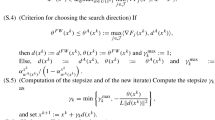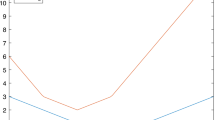Abstract
We present a global algorithm for indefinite knapsack separable quadratic programs with bound constraints. The upper bounds on variables with nonconvex terms are assumed to be infinite in the algorithmic development. By characterizing optimal solutions of the problem, we enumerate a subset of KKT points to determine a global optimum. The enumeration is made efficient by developing a theory for shrinking and partitioning the search domain of KKT multipliers. The global algorithmic procedure is developed based on interval and point testing techniques that have roots in solving strictly convex problems. Our algorithm has quadratic (worst-case) complexity and its performance is demonstrated on a broad range of randomly generated problem instances and comparisons with existing global and local solvers. It turns out that our method can solve these nonconvex problems of extremely large size in a fraction of the time (relative to commercial software such as CPLEX 12.6) on a desktop computer. Furthermore, a feasible upper bounding scheme is developed for the case when the variables with nonconvex terms are allowed to have finite upper limits, using an iterative application of the above global algorithm, and the computational experience is presented.






Similar content being viewed by others
Notes
If some \(a_k<0\), then perform the transformation \(x_k\leftarrow -x_k,\,a_k\leftarrow -a_k,\,c_k\leftarrow -c_k,\,l_k\leftarrow -u_k\), and \(u_k\leftarrow -l_k\). If \(a_k=0\), then solve (QP) without \(x_k\) and the optimal value of \(x_k\) is determined by the univariate minimization: \(\min \{0.5d_kx^2_k-c_kx_k\;:\; l_k\le x_k \le u_k \}\).
References
Bazaraa, M.S., Sherali, H.D., Shetty, C.M.: Nonlinear Programming, Theory and Applications, 3rd edn. Wiley, New York (2006)
Bretthauer, K.M., Shetty, B.: The nonlinear knapsack problem-algorithms and applications. Eur. J. Oper. Res. 138(3), 459–472 (2002)
Chen, J., Burer, S.: Globally solving nonconvex quadratic programming problems via completely positive programming. Math. Programm. Comput. 4(1), 33–52 (2012)
Dai, Y.H., Fletcher, R.: New algorithms for singly linearly constrained quadratic programs subject to lower and upper bounds. Math. Programm. 106(3), 403–421 (2006)
Du, D.Z., Pardalos, P.M.: Handbook of Combinatorial Optimization, vol. 3. Springer, New York (1998)
Helgason, R., Kennington, J.L., Lall, H.: A polynomially bounded algorithm for a singly constrained quadratic program. Math. Programm. 18(3), 338–343 (1980)
Horst, R., Pardalos, P.M., Van Thoai, N.: Introduction to Global Optimization. Kluwer Academic Pub, Dordrecht (2000)
Kellerer, H., Pferschy, U., Pisinger, D.: Knapsack Problems. Springer, New York (2004)
Kiwiel, K.: Breakpoint searching algorithms for the continuous quadratic knapsack problem. Math. Programm. 112, 473–491 (2008)
Moré, J.J., Vavasis, S.A.: On the solution of concave knapsack problems. Mathe. programm. 49(1), 397–411 (1991)
Pardalos, P.M., Glick, J.H., Rosen, J.B.: Global minimization of indefinite quadratic problems. Computing 39(4), 281–291 (1987)
Pardalos, P.M., Kovoor, N.: An algorithm for a singly constrained class of quadratic programs subject to upper and lower bounds. Math. Programm. 46(3), 321–328 (1990)
Pardalos, P.M., Vavasis, S.A.: Quadratic programming with one negative eigenvalue is NP-hard. J. Glob. Optim. 1, 15–23 (1991)
Sahni, S.: Computationally related problems. SIAM J. Comput. 3(4), 262–279 (1974)
Vavasis, S.A.: Approximation algorithms for indefinite quadratic programming. Math. Programm. 57(2), 279–311 (1992)
Vavasis, S.A.: Local minima for indefinite quadratic knapsack-problems. Math. Programm. 54(2), 127–153 (1992)
Yajima, Y.: Quadratic knapsack. In: Floudas, C.A., Pardalos, P.M. (eds.) Encyclopedia of Optimization, 2nd edn, pp. 3159–3161. Springer, New York (2009)
Acknowledgments
Without implicating them, we sincerely thank Stephen Vavasis and Samuel Burer for sharing their computer codes, and Yu-Hong Dai and Roger Fletcher for clarifying certain aspects of their papers. We are also indebted to the anonymous referees for their careful and insightful reviews. All remaining errors in this paper are ours.
Author information
Authors and Affiliations
Corresponding author
Rights and permissions
About this article
Cite this article
Edirisinghe, C., Jeong, J. An efficient global algorithm for a class of indefinite separable quadratic programs. Math. Program. 158, 143–173 (2016). https://doi.org/10.1007/s10107-015-0918-x
Received:
Accepted:
Published:
Issue Date:
DOI: https://doi.org/10.1007/s10107-015-0918-x




